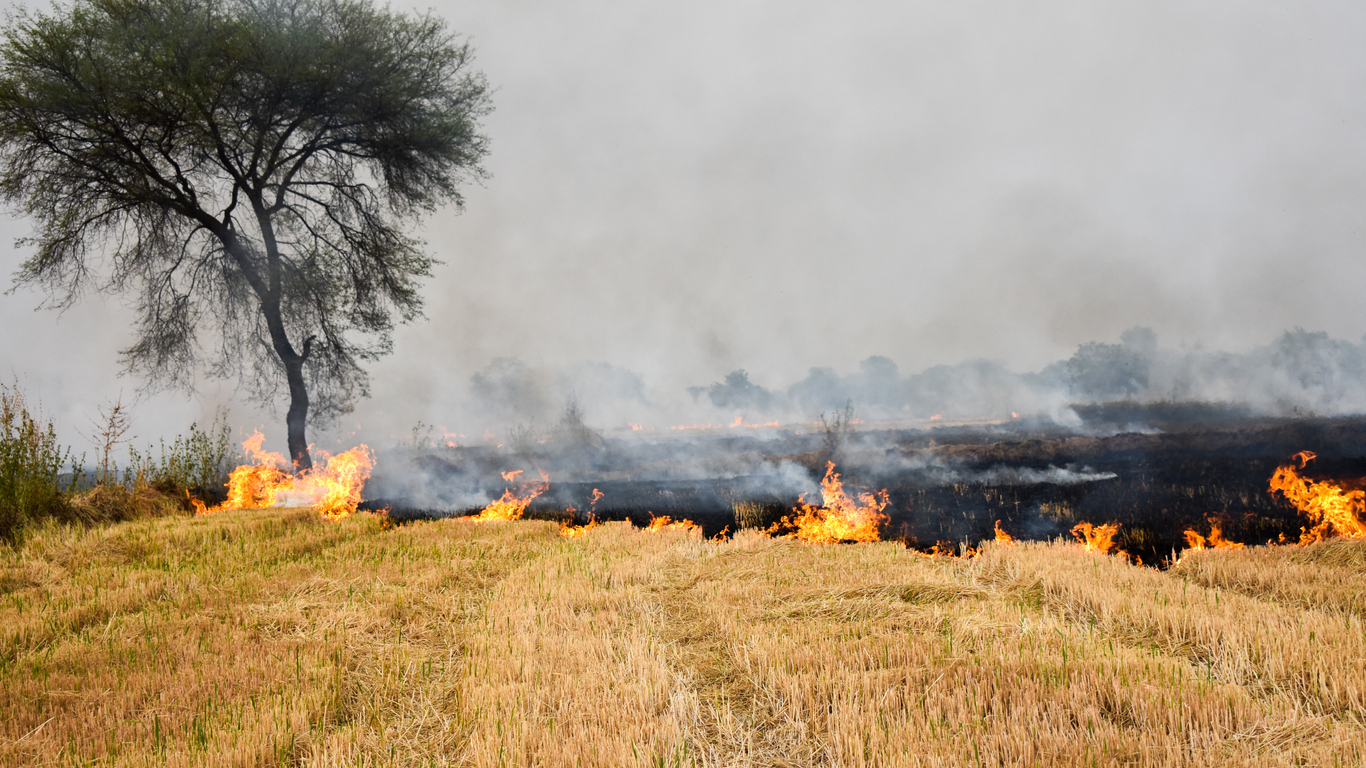
Kejriwal, Mann admit responsibility for stubble burning in Punjab

Delhi Chief Minister Arvind Kejriwal and Punjab Chief Minister Bhagwant Mann on Friday (November 4) took full responsibility for paddy straw (parali) burning in the border state and promised to curb the practice by next winter amid alarming levels of air pollution in the national capital.
The air quality in Delhi continues to be in the ‘severe’ category for a second consecutive day. The contribution of stubble burning in neighbouring states (especially Punjab) to PM (particulate matter) 2.5 in Delhi was 34% on Thursday (November 4), up from 12% on Wednesday.
At a press conference on Thursday, in which the AAP chief was joined by Punjab CM Bhagwant Mann, Kejriwal reiterated that the Centre has to come up with a joint action plan to tackle air pollution keeping all the political posturing aside.
Also read: Kejriwal, Mann admit responsibility for stubble burning in Punjab
Taking note of the deteriorating air quality in Delhi, Kejriwal said that primary schools in Delhi would be closed from Saturday and outdoor activities would be restricted for secondary school students. The announcement came a day after schools in Noida (Uttar Pradesh) were told to hold online classes till November 8.
Delhi Environment Minister Gopal Rai, addressing the press separately, said that 50% of government staff would be working from home. He said a similar advisory has been issued for private offices.
Also read: Delhi primary schools closed
Additionally, revenue commissioners have been asked to prepare a plan for staggered timings of markets and offices. A six-member team of senior officials has been set up to monitor the implementation of the curbs on anti-polluting activities.
See pollution in North Indian towns. Its not just Punjab and Del. Entire North India suffering from severe pollution. Lets stop blame game. Lets find solutions as a country
Its our first yr in Punjab. Punjab govt tried its best in short time. By next yr, we shud see good results pic.twitter.com/6FeSIE1FkW
— Arvind Kejriwal (@ArvindKejriwal) November 4, 2022
NHRC intervenes
The National Human Rights Commission (NHRC) has expressed concern over the deteriorating air quality in the national capital.
The human rights body, while expressing displeasure over the handling of the pollution crisis, has asked the chief secretaries of Punjab, Haryana, Uttar Pradesh and Delhi to be present before it either personally or in hybrid mode on November 10 for a detailed discussion in this regard.
Also read: Pollution on, Kejriwal gone: Congress demands CM’s resignation over Delhi air quality
The commission was of the view that much more needed to be done to control the air pollution in Delhi-NCR.
CAQM orders enforcement of stage 4 measures
The Commission for Air Quality Management (CAQM) in NCR and adjoining areas ordered state governments and pollution control boards in the NCR to implement a ban on the entry of trucks into Delhi. Exceptions have been made for trucks carrying essential commodities, providing essential services and to all CNG and all-electric trucks.
The Commission has also ordered a ban on plying of four-wheeler diesel LMVs (Light Motor Vehicles) in Delhi and districts bordering Delhi, except BS-VI vehicles and those used for essential services. Under stage-4, state governments may consider additional emergency measures like closure of educational institutions.
Enforcing ban on diesel vehicles not easy
Transport department officials feel that enforcing the ban on diesel cars will be a tough task. As there is no mechanism to differentiate between a BS-IV and a BS-VI compliant vehicle from a distance without stopping it. The enforcement can be effective only if done manually through colour-coded stickers which identify the fuel type of the vehicle.
Also read: SC to hear PIL on Delhi’s air pollution on Nov 10
According to an estimate by the transport department, there are nearly 3 lakh diesel vehicles that have a BS-III or BS-IV engine. Vehicles are considered to be the biggest contributor to local particulate matter (PM) in Delhi.
In 2018, Delhi became the first city in the country to switch from BS-IV grade fuels to BS-VI (equivalent to fuel meeting Euro-VI emission norms).
Politics over use of decomposer in Punjab
In a strongly worded statement, Union environment minister Bhupender Yadav claimed that Delhi CM Kejriwal has officially refused to use the bio-decomposer to prevent stubble burning in Punjab.
The minister said the Delhi government had earlier written to the CAQM saying they had successfully used the bio-decomposer in Delhi but have now found the results ineffective in Punjab. However, the AAP hit back, asking Yadav to show the letter where Kejriwal officially refused to use it in Punjab.
The AAP government is also contemplating bringing back odd-even traffic rationing measures for vehicles in the national capital.
Sample this: As of today, Punjab, a state run by the AAP government, has seen an over 19% rise in farm fires over 2021. Haryana has seen a 30.6% drop.
Just today, Punjab saw 3,634 fires.
There is no doubt over who has turned Delhi into a gas chamber.
Wondering how? Read on… pic.twitter.com/Nh8fYN9gnf
— Bhupender Yadav (@byadavbjp) November 2, 2022

